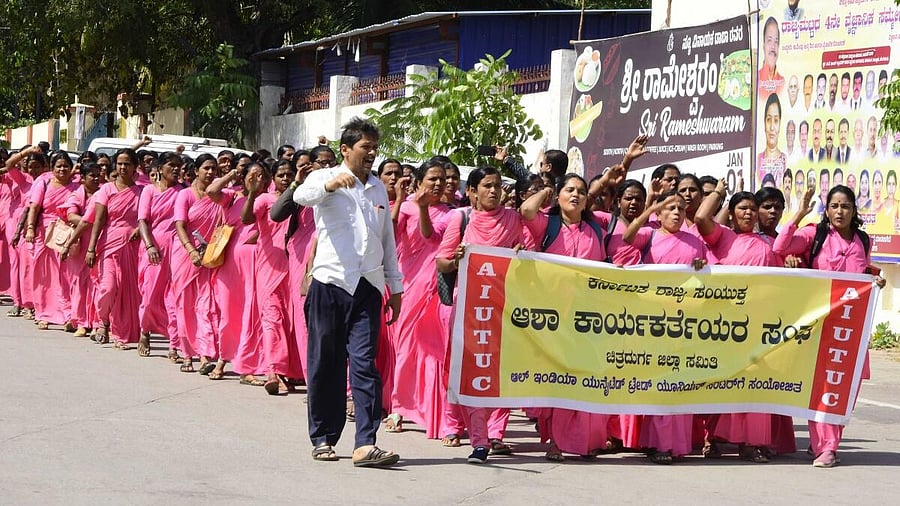
Protesting ASHA workers
Credit: DH Photo
Over 42,000 ASHA (Accredited Social Health Activist) workers in Karnataka will go on an indefinite strike from January 7 to demand fixed and better wages and recognition for their efforts in healthcare delivery.
As a crucial part of the National Health Mission, ASHA workers bridge the gap between people and the healthcare system, especially in rural areas. Although classified as volunteers, they are, in reality, the backbone of various government campaigns covering immunisation, maternal health, sanitation, and disease prevention.
Their responsibilities include promoting safe childbirth, conducting health education programmes, and facilitating access to healthcare for marginalised communities. Often working in remote areas, they act as lifelines for people with limited access to medical facilities.
Despite their significant contributions, ASHA workers are not recognised as employees, which is at the core of their current demands.
Their compensation is based on task-based incentives, which means they are paid for the work they do, but get no fixed salary. The paltry honorarium they receive barely covers their essential expenses, leaving them in a precarious financial situation.
The workers are seeking a fixed monthly honorarium of Rs 15,000, with an additional Rs 2,000 for city-based workers to meet higher living costs, and recognition as formal employees with benefits such as gratuity, provident fund and Employees State Insurance (ESI).
In addition, they are seeking pending payments, annual health check-ups, and free treatment for severe illnesses. They are also demanding the withdrawal of a new directive that mandates the use of smartphones for their duties.
The insistence on digital tools, without considering the financial constraints of these workers, mostly from low-income families, highlights the broader issue of neglect and disregard for their basic needs.
The government’s inaction on these pressing concerns not only disempowers the workers, but also imperils the quality of rural healthcare. ASHA workers are the frontline warriors in the fight against diseases, malnutrition, and maternal and child mortality.
Without their support, public health campaigns would crumble, and the health outcomes for vulnerable populations would worsen. Given their invaluable contribution to the healthcare system, it is imperative that the government acknowledge and address their legitimate demands.
Their role in ensuing last-mile healthcare is critical and their rights deserve priority. The proposed strike is more than a protest for better wages and benefits; it is a call for dignity, justice and recognition of their indispensable role in the health of the nation.
